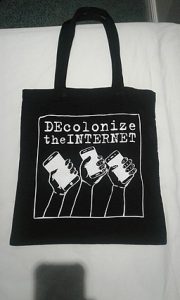In Winter 2020, Term 2, Professor Philip offers two courses:
Engl 232 002, Approaches to Media Studies (Undergraduate) & ENGL 561 (3-12) Topics in Science and Technology Studies (Graduate)

Photo credit: Whose Knowledge? whoseknowledge.org
Draft course descriptions below (please note that courses are subject to change depending on the circumstances):
Approaches to Media Studies : Digital Disruptions
The digital revolution seemed to alter global media production and consumption in some fundamental ways – but what are those? To better understand the media changes we are living through, this class will put “new” digital media into dialogue with “older” mediated technologies including eighteenth-century automata, the nineteenth-century telegraph, and twentieth-century television. Further interrogating the rise of digital media and its consequences, we ask whether the late twentieth century’s global, near-instantaneous circulation of media brought issues of race, gender, orientalism, and post-colonial geopolitics into new political configurations. Do new circulations of digital media disrupt, resist, and rewrite earlier forms of media theory? To understand the broader social meanings of mediated forms of political practice, we put media studies into conversation with feminist informatics, anti-racist technical practice, and postcolonial theory. Readings will include authors such as Stuart Hall on race and media cultures, Jeffrey Sconce on haunted media histories, Lucy Suchman on militarist games, Lisa Parks on media infrastructure, Irani and Silberman on Amazon Mechanical Turk.
Approaches to STS: Decolonizing Technoscience
Structural relations between colonial power and scientific knowledge production have shaped political and cultural life since the nineteenth century. Objectivity, facts, experiment, and the scientific method gained global authority and political power at a time when European powers dominated much of the non-western world. Even as decolonization, anti-imperial movements, and neoliberalism variously shifted global political relations over the next two centuries, scientific objectivity was often believed to be neutral, and held up as aspirational for developing nations. Today, activist and scholarly calls to decolonize knowledge force us to rethink the relationship between technoscientific practice and political power. Histories of empire, decolonization, and development have been drawn into conversation with the history, philosophy, and anthropology of science and technology. This course offers a graduate-level introduction to these fraught but urgent conversations. Readings include writing in colonial history, development studies, informatics, feminist science studies, and science fiction, via the work of STS scholars such as Donna Haraway and Warwick Anderson, historians of science Marwa Elshakry, Gabrielle Hecht, Lorraine Daston, and Thomas Kuhn; geographers Gillian Hart and Neil Smith; and many writers whose names may be less widely known for reasons connected to the failures of decolonial politics. Through widely interdisciplinary reading, we will seek to understand the significance of the “decolonizing turn” in technical practice and scientific knowledge production. Students from all disciplinary backgrounds are welcome to bring a critical, open, engaged perspective.
